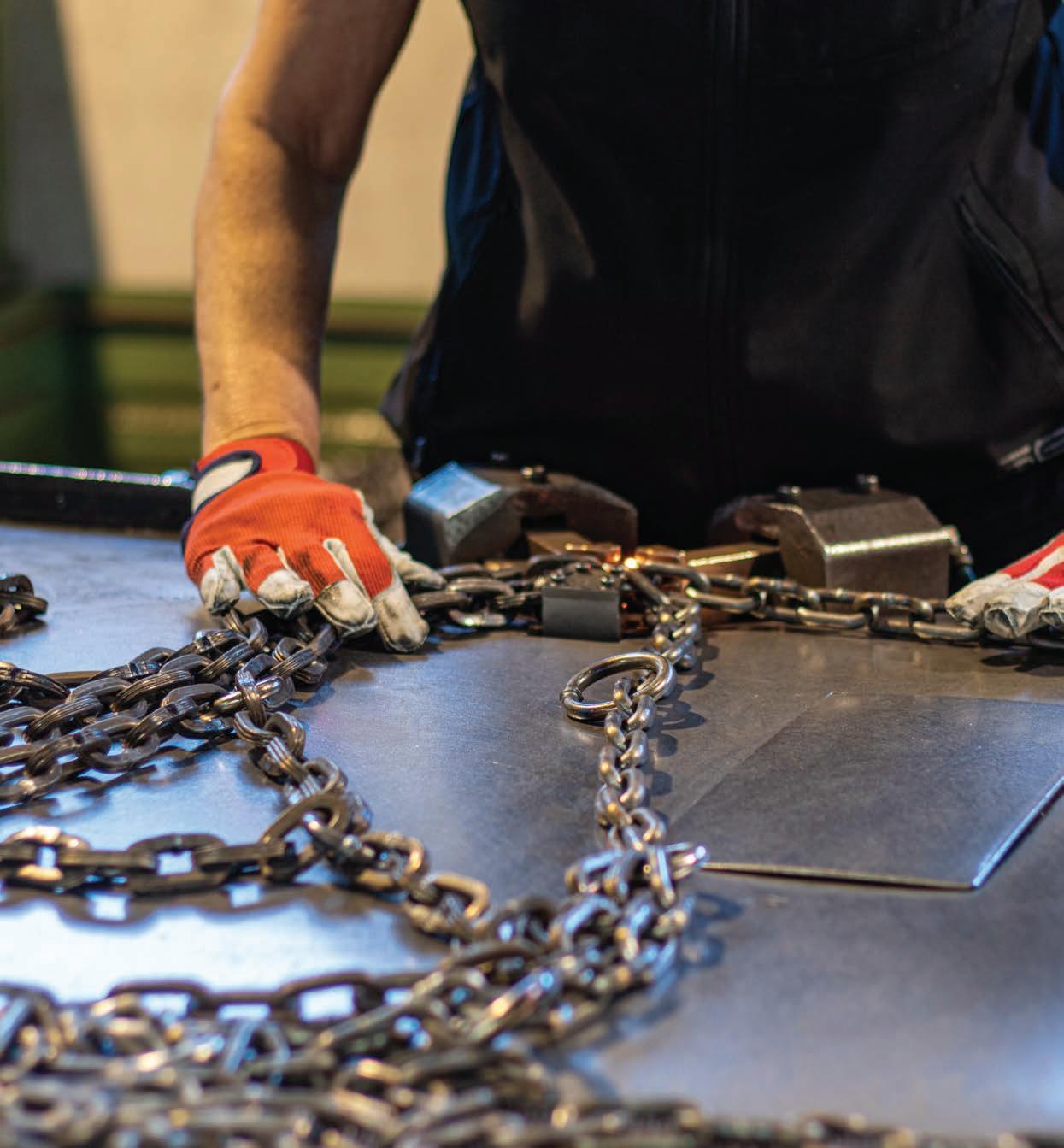Code of Conduct for Suppliers

Code of Conduct for Suppliers 2024
Publisher: pewag AG
Version: 2 58-GPD.05.03.01/B-MD, EN
Issue Date: June 2024
Before printing, please consider the environment.



Code of Conduct for Suppliers 2024
Publisher: pewag AG
Version: 2 58-GPD.05.03.01/B-MD, EN
Issue Date: June 2024
Before printing, please consider the environment.

Combining entrepreneurial action with ethical principles is a long tradition for the pewag group and one of the essential factors for long-term success. We are convinced that ethical and economic values are interdependent and that, as members of the business community, we must strive to treat each other fairly and operate within established norms.
We adhere to the highest standards of integrity and act honestly and fairly throughout the value chain, in compliance with applicable laws and regulations, international standards and industryspecific guidelines, such as the Automotive Sustainability Guiding Principles 4.0 (AIAG / drive sustainability).
Our claim is to live up to our corporate responsibility towards people and the environment.

Business Ethics
• No Corruption, Extortion, Bribery or Money Laundering
• Data Protection and Data Security
• Financial Responsibility / Accurate Records
• Disclosure of Financial and Non-financial Information
• Avoidance of Conflicts of Interest
• Protection of Intellectual Property
• Dealing with Counterfeit Parts
• Export Controls, Trade, and Economic Sanctions
• Grievance Mechanism
• Elimination of Defects
• Protection from Retaliation
Consideration of Stakeholders
• Consumer Concerns
• Responsible Supply Chain and Due Diligence
• Development of Society
Human Rights and Working Conditions
• Protection against child labor and for young workers
• Wages and Benefits
• Working Hours
• Protection from Modern Slavery
• Ethical Recruiting
• Freedom of Association and Collective Bargaining
• Non-Discrimination and Harassment
• Problem Solving Culture
• Equality • Diversity, Equity, and Inclusion
• Land Rights and Forced Eviction
• Private or Public Security Forces Health and Safety
• Workspace and Ergonomics
• Personal Protective Equipment
• Emergency Preparedness
• Incident and Accident Management
• Contractors

• Carbon Neutrality
• Water Quality, Consumption & Management
• Air Quality
• Responsible Chemical Management
• Circular economy, sustainable resource management and waste reduction
• Biodiversity, Land Use and Deforestation
• Soil Quality
• Noise Emissions
• Responsible Sourcing of Raw Materials and Minerals

This Code of Conduct for our suppliers defines the necessary minimum requirements for corporate, social and environmentally conscious behavior, which we expect not only from us but also from our suppliers and partners to comply with. By complying with applicable laws, adhering to the ethical principles summarized here, and applying best practices within our industry, together we can achieve excellent performance in a transparent and sustainable manner.
Ägyd Pengg CEO


We take responsibility for:

Suppliers should uphold the highest standards of integrity and operate honestly and equitably throughout the supply chain. Suppliers should implement a management system that includes the following guiding principles:
1.1.1
Our suppliers should not participate in or endorse any corrupt practices in whatever form, including offering or accepting bribes, excessive gifts or hospitality or facilitation payments. Suppliers should not facilitate or support money laundering. Suppliers should report any suspicious transactions and be alert for signs of money laundering.
1.1.2
Our suppliers should respect the privacy and civil liberties in respect of the collection, retention, use or dissemination, as well as any other processing of personal data.
1.1.3
Our suppliers should perform their business dealings in a transparent manner and accurately reflect them in the companies’ financial reports and filings. Suppliers should confirm an adequate financial reporting system control is in place.
1.1.4
Our suppliers should disclose financial and nonfinancial information in accordance with applicable regulations and prevailing industry practices.
1.1.5
Our suppliers should ensure that their employees avoid and disclose situations where their financial or other interests conflict with job responsibilities, or situations giving any appearance of impropriety.
1.1.6
Our suppliers should respect valid intellectual property rights.
1.1.7
Our suppliers should minimize the risk of introducing counterfeit and/or diverted parts and materials into deliverable products and adhere to relevant technical regulations in the product design process.
1.1.8
Our suppliers should comply with applicable restrictions on the export or re-export of goods, software, services and technology, as well as with applicable restrictions on trade involving certain countries, regions, companies or entities and individuals.
1.1.9
Our suppliers should establish an effective grievance mechanism in line with UN Guiding Principle 31 that allows concerns related to business ethics, human rights, or any other topic to be raised anonymously, confidentially and without retaliation.
1.1.10
Our suppliers should provide for or cooperate in remediation through legitimate processes when their business activities cause or contribute to adverse environmental or social impacts.
1.1.11
Our suppliers should avoid any form of threats, intimidation, and physical or legal attacks against stakeholders, including those exercising their legal rights to freedom of expression, association, peaceful assembly and protest against their business activities.
At pewag group we are committed to live up to our corporate responsibility towards people and environment. We expect our suppliers to commit to the guiding principles of this code of conduct for our suppliers.
1.2.1
At pewag group we strive to offer the best solutions on the market as well as to exceed our customers‘ expectations. We expect our suppliers to contribute to this goal, each one with its excellence and innovation.
1.2.2
Suppliers should conduct due diligence on their direct suppliers and subcontractors in accordance with the OECD Due Diligence Guidance for Responsible Business Conduct, promote transparency and traceability and use their best efforts to implement the ESG standards further along the supply chain, and cascade the Guiding Principles further along the supply chain.
1.2.3
Suppliers should, within the scope of their possibilities, try to contribute to the sustainable development of society.

We take responsibility for:

Our suppliers must respect the human rights of workers, local communities and other relevant stakeholders, and prevent and address adverse human rights impacts linked to their business activities, in accordance with the UN Guiding Principles on Business and Human Rights.
2.1.1
Our suppliers must observe the minimum employment age in their business activities and throughout their supply chain in accordance with the ILO Minimum Age Convention and shall ensure that child labor is not tolerated in any form.
Our suppliers must provide their workers with remuneration in accordance with applicable regulations and prevailing industry practices; such remuneration should be adequate to cover basic needs and enable a decent standard of living for the workers and their families, which includes respecting minimum wages, overtime compensation, medical leave and governmentmandated benefits.
2.1.3 Working Hours
Our suppliers must comply with local laws and collective bargaining agreements (where applicable) regarding working hours, or should comply with the ILO Standards on Working Time in the absence of relevant local regulations.
2.1.4 Protection from Modern Slavery
Our suppliers must prohibit any forms of forced, bonded or compulsory labor, including human trafficking.
Our suppliers must not mislead or defraud potential workers about the nature of the work, ask workers to pay recruitment fees, and/or confiscate, destroy, conceal, and/or deny access to worker passports and other government-issued identity documents. Workers must receive a written contract or employment notification at the start of their recruitment in a language well understood by them, stating in a truthful, clear manner their rights and responsibilities.
2.1.6
Our suppliers should allow workers to communicate openly with management regarding working conditions and
management practices without fear of reprisal, intimidation or harassment. Companies should respect worker rights to associate freely, to join or not join labor/labour unions, bargain collectively, seek representation and join workers’ councils.
Our suppliers should not tolerate any form of discrimination or harassment in respect of employment and occupation and should provide equal employment opportunities regardless of worker or applicant characteristics such as age, gender, sexual orientation, gender identity, ethnicity or national origin, disability, pregnancy,
2.1.8
religion, political affiliation, union association, covered veteran status, genetic information or marital status.
Our suppliers have to describe problems in such a way that they are well understood by the author and can also be understood and solved by other persons. Criticism has to be made in a factual and constructive manner, not looking for someone to blame but for causes that lead to a solution.
2.1.9 Equality
Suppliers should provide equal opportunity in employment and commit to equal pay for equal work.
2.1.10 Diversity, Equity, and Inclusion
Suppliers should develop and promote inclusive cultures at all levels, where diversity is valued and celebrated, and everyone is able to contribute fully and reach its full potential.
2.1.11 Land Rights and Forced Eviction
Suppliers should avoid forced eviction and the deprivation of land, forests and waters in the acquisition, development or other use of land, forests and waters.
2.1.12 Private or Public Security Forces
Suppliers should not commission or use private or public security forces to protect the business project if, due to a lack of training or control on the part of the company, the deployment of the security forces may lead to violations of human rights.
Suppliers should provide workers a safe and healthy working environment that meets or exceeds applicable local laws and industry standards for safety and occupational health.
2.2.1 Workspace and Ergonomics
Suppliers should provide a working environment that meets or exceeds local and national safety, occupational health, and fire safety legislation, in addition to encouraging remote workers to understand and apply best practices.
2.2.2 Personal Protective Equipment
Where applicable, suppliers should provide their workforce with necessary Personal Protective Equipment (PPE) and ensure they understand how and when it needs to be applied.

Suppliers should reduce the risk of occupational hazards and develop an emergency preparedness and response plan.
2.2.4
Suppliers should implement hazard and risk analysis systems to minimize the potential for incidents or accidents at the workplace. An investigation system should drive to determine the root cause, and a corrective action system should ensure all permanent measures have been taken to minimize the chance of a recurrence.
2.2.5 Contractors
Suppliers should properly manage the health and safety of contractors as part of a company’s extended supply chain. Suppliers should coordinate their procurement processes to identify hazards and to assess and control risks arising from the contractor’s business activity with the supplier, and the company’s business activity that impacts the contractors’ workers.
We take responsibility for:

Suppliers should develop, implement, and support a proactive approach to environmental responsibility through environmental protection practices, conserving natural resources and reducing overall environmental footprint of production, goods and services throughout their life cycle.
3.1.1
Suppliers should strive to set science-based and time-bound emission reduction goals and renewable energy objectives that are aligned with the Paris Agreement, and put in place measures that drive forward the decarbonisation of the entire value chain.
Suppliers should minimize water consumption, effectively reuse and recycle water with responsible treatment of wastewater discharges and prevent potential impacts from flooding as a consequence of rainwater run-off, as required by and in accordance with applicable law.
3.1.3
Suppliers should routinely monitor and disclose, appropriately control, minimize, and to the extent possible, eliminate emissions contributing to air pollution, as required by and in accordance with applicable law.
3.1.4
Suppliers should identify, minimize or eliminate the use of restricted substances in manufacturing processes and finished products to ensure regulatory compliance. Companies should also be aware of any use of restricted substances in processes and finished products, and actively investigate suitable
3.1.5
substitutes to maintain product and environmental stewardship.
Suppliers should promote closed loop systems by supporting the use of sustainable, renewable natural resources while reducing waste and increasing reuse and recycling.
Suppliers should protect ecosystems, especially key biodiversity areas, impacted by their operations, and avoid illegal deforestation in accordance with international biodiversity regulations, including the IUCN Resolutions and Recommendations on Biodiversity.
3.1.7
Where appropriate, suppliers should monitor and control their impact on soil quality to prevent soil erosion, nutrient degradation, subsidence and contamination.
3.1.8
Where appropriate, suppliers should monitor and control the levels of industrial noise to avoid noise pollution.
3.1.9
Suppliers should responsibly source raw materials and minerals used in their products by promoting supply chain traceability and transparency, and by implementing due diligence measures in accordance with OECD Due Diligence Guidance for Responsible Supply Chains of Minerals from Conflict-Affected and High-Risk Areas.

pewag AG
A-9020 Klagenfurt, Schleppe-Platz 8, Phone: +43 (0) 50 50 11-0, office@pewag.com
